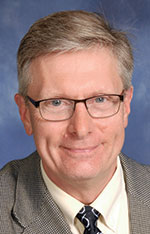Corrections Corner / Deacon John Cord
Addictions and mental health in our jails and prisons, part 2
 Last month, I wrote about the issue in our jails and prisons concerning the large number of mentally ill people who are incarcerated. Several people wrote to me to ask: “What can we do about this issue?”
Last month, I wrote about the issue in our jails and prisons concerning the large number of mentally ill people who are incarcerated. Several people wrote to me to ask: “What can we do about this issue?”
As a reminder, it is estimated that about 65% of the people in our jails and prisons in the U.S. have one or more mental illnesses. Approximately 24% have a serious mental illness that requires constant medication and supervision. Our prisons have become our mental health hospitals. This is not an acceptable solution.
Many of our politicians like to use the phrase, “Get tough on crime.” We, the voters, like to think that this policy makes us safer. However, studies have shown that there has been no appreciable decrease in crime since the 1970’s when this phrase first became popular. As a matter of fact, our prisons have become a place where people can learn how to be better criminals. Our crime rate and recidivism rate have climbed to the highest in the world.
In her book Waiting for an Echo: The Madness of American Incarceration, Dr. Christine Montross addresses this question. She is a psychiatrist who has spent several years working in our prison system. She has also spent a large amount of time studying what other nations are doing differently than the U.S.
Montross has recently focused her research on Norway. In the 1960’s and 1970’s, Norway had a higher crime and recidivism rate than the U.S., using a similar incarceration system. In the 1980’s, they decided they needed to do something very different. They changed from a penal system to a system of rebuilding the person who committed a crime. Since that time, their crime rate and recidivism rate have dropped to among the lowest in the world.
Norway spends a large amount of time evaluating every person who is convicted. They look at the many factors that caused the person to end up committing a crime. These include their home and neighborhood environment and their physical and mental health. After the evaluation, they tailor a program for the individual to help them return to society as quickly as possible to become a fully functioning citizen. They educate them to create skills and talents that help them succeed.
Society plays a very large part in why a person ends up committing a crime. Very few people commit crimes just because. Most commit crimes to survive. Keep in mind that a large percentage who commit crimes are mentally ill.
Catholic social teaching informs us that we are to respect and care for every person. We need to do our best to lift up everyone, especially those on the margins and those with mental health challenges. It is our responsibility to create an environment where people are not put in a position of needing to commit crimes to survive. It is our responsibility to care for our mentally ill brothers and sisters. Locking up people because they are in need or mentally ill is wrong.
Please reach out to your legislators. Tell them we must stop incarcerating people just because they are in need. Tell them we must start helping our brothers and sisters instead of punishing them. In the end, we will have less crime and a healthier nation.
(Deacon John Cord is the coordinator of Corrections Ministry for the archdiocese. To volunteer in prison ministry, check with your parish office to see if a ministry already exists. If not, contact Deacon Cord at jcord@archindy.org.) †
 Last month, I wrote about the issue in our jails and prisons concerning the large number of mentally ill people who are incarcerated. Several people wrote to me to ask: “What can we do about this issue?”
Last month, I wrote about the issue in our jails and prisons concerning the large number of mentally ill people who are incarcerated. Several people wrote to me to ask: “What can we do about this issue?”